- Home
- Deborah Smith
At Home in Mossy Creek Page 5
At Home in Mossy Creek Read online
Page 5
“How’s the photography going?” Linda asked before he could leave the desk.
He clammed up tighter than a book with new binding. “Pretty well,” he said tersely. “The light was good today.” Then shoving away from the desk, he headed off to his usual spot on the worn couch in the reading area.
“That was rude,” Linda muttered under her breath.
“He doesn’t like talking about his work.” And I should know, since I’d tried questioning him about it a few times. Invariably it got me the cold shoulder, though he was more than happy to discuss books and art and music.
A mysterious man, our Mr. Crogan. Unfortunately, that did nothing to subdue my rampant interest.
“I guess I’d better go,” Linda said, handing the window cleaner over the desk. “Sorry I can’t stay until closing tonight.”
“No problem. The place is practically deserted anyway.”
But that was fine by me. To tell the truth, I preferred the library to just about anywhere else in town, especially when I had Rachel with me. It was safe and bright and blessedly devoid of sharp objects, so I never had to worry about her getting hurt. Knocking stuff off shelves, yes, but not getting herself hurt.
Minutes after Linda headed out, the front door opened again, and Mossy Creek police officer Sandy Crane hurried in, towing a thin blond woman whose wan cheeks showed the strain of late nights and long hours. “You haven’t changed your mind about taking in one of the Cirque d’Europa people, right?”
I stifled my groan. I’d completely forgotten about our phone conversation earlier. “Of course, not.” I managed a smile for the thin woman, who returned it tentatively. “Rachel said she’ll give up her room and sleep with me for as long as necessary.”
“Good.” Sandy turned to the woman. “This is Mrs. Longstreet. You’ll be staying with her and Rachel.”
“Rachel. Yes,” the woman said.
Sandy frowned. “No, Rachel is her daughter. This is—”
“Hannah,” I corrected her, wanting to put the woman at ease. “Call me Hannah.”
“Hannah?” The woman looked confused.
Sandy’s cell rang, and she answered it. “Yes, Chief. I’m headed over there now.”
As she pocketed the phone, she glanced at me. “Gotta go. This lady’s name is Monique Laplante. That’s about all I can tell you.”
“But what—” Too late. Sandy had already sprinted out the door, leaving me with a circus performer who was starting to look a little panicked.
“I can’t leave until closing,” I explained to Monique, “but until then you’re free to read or use one of the terminals to check your e-mail.” I noticed Mr. Crogan listening in on the conversation as the woman just stared at me. “Are you hungry? Have you had anything to eat?”
Her lips quivered. “Parlez-vous Francais?”
My heart sank. Sandy had conveniently neglected to mention that the woman didn’t speak English.
“Je parle Francais,” said Mr. Crogan, unfolding his angular body from where it was sprawled on the couch.
“You speak French?” I said as he headed for us. “You told me you were born and raised in Scotland.”
“Yes, but my mother was originally from Burundi, where French is the state language. I grew up bilingual.”
“I grew up uni-lingual, I’m afraid. Would you mind telling Ms. Laplante that she’s staying with me and my daughter?”
“You and your daughter and . . . er . . . your husband?”
Oh, Lord. It had never occurred to me that Mr. Crogan might not know I was a widow. “My husband passed away some years ago.”
“Ah,” he said with what I would have sworn was relief. “I wasn’t sure.”
I liked that he didn’t say he was sorry, as if it could possibly be his fault. I never knew how to answer people who did. Luke’s aneurysm wasn’t anybody’s fault . . . not even Luke’s.
I lifted my left hand and wiggled my fingers. “No ring. I guess you didn’t notice.”
“Oh, I noticed. But divorced women don’t usually go by Mrs. these days and you’re so young to be a widow that—” He halted, as if realizing he’d just revealed how thoroughly he’d considered the matter. “Anyway . . .” he mumbled, and abruptly turned to Monique.
He said something in French, and she nodded vigorously, casting me a shy smile as she replied.
“She says to call her Monique,” Mr. Crogan explained.
“Would you ask if she’s eaten?”
A short conversation ensued between him and the Frenchwoman, in which the only words I picked out were “McDonald’s” and “café.”
Mr. Crogan turned to me. “It seems she and her companions stopped for a bit of lunch, but the poor lass has had no more than coffee since then.”
“That won’t do.” I gestured toward the back of the library. “There’s yogurt in the refrigerator in the break room. That might hold her until the library closes. Rachel’s back there—she can show you where I keep the potato chips.”
He arched an eyebrow. “Potato chips and yogurt? Quite the interesting diet you have there, Mrs. Longstreet.”
“The potato chips are for Rachel.”
“A likely story.” His eyes glinted with mischief. “Are you sure you don’t dip them in yogurt whenever no one’s looking?”
Oh my God, he was flirting with me. Wasn’t he?
I struggled to keep my tone light. “Hey, the only weird food I will admit to is my dad’s toasted peanut butter and ketchup sandwiches.”
“That’s certainly a vile-sounding combination.”
I shrugged. “They’re not as bad as you’d think. Besides, don’t you Scots eat haggis and kippers?”
“Ah, but haggis and kippers are delicious, something you’d realize if you ever tried them. In fact—” He cast me a challenging glance. “We should do more than speculate about our respective cuisines. If you’ll agree to try kippers, I’ll agree to try your horrible sandwiches.”
“You’re on,” I said blithely.
“Really? I expected to have to do a bit more convincing.”
I laughed. “You’ll never find kippers in Mossy Creek.”
The sudden devilish grin transforming his dusky features gave me pause. “I wouldn’t lay odds on that if I were you.” He lifted one eyebrow. “So it’s a date, is it?”
My heart began to pound. “Sure. A food-tasting date.”
“I won’t forget,” he said, then winked as he led Monique to the back of the library.
Mr. Crogan had winked at me. And flirted. And asked me out on a date. Well, a sort of date.
I wiped my clammy hands on my slacks. I must be out of my mind. He was in town temporarily. Nothing could come of this.
Freelance photographers can live anywhere.
I groaned. That line of thinking was dangerous. And here I’d thought that the library was safe—apparently sharp objects came in more than one guise.
For the next hour or so, I tried not to feel left out as sounds of a party going on in the break room wafted out to me. My daughter’s high-pitched Southern accent mingled with the low rumble of Mr. Crogan’s Scots English, which was interrupted by bursts of melodious French in both his and Monique’s voices. It was like listening to a multi-national orchestra from outside the auditorium.
But I didn’t dare leave my post. Someone had to man the desk. Besides, I had work to do.
For one thing, I had to Google “David Crogan” and the word kippers. Unfortunately, that led me in every direction except the one that told me more about my mysterious photographer.
With a sigh, I glanced at the clock. Almost closing time, thank God. Remembering what Linda had said about a makeover, I whipped out my compact and put on the lipstick I rarely used, then finger-combed my spiky blond hair.
/>
My daughter suddenly dashed from the break room. As I whisked my makeup away, Rachel stumbled over a chair, reeled toward a bookshelf, then caught herself before she sent books flying. She finished off by rushing breathlessly up to the desk. “Mom, did you know Mr. Crogan’s dad is Scottish?”
“Is he?” I said, trying to sound cool and professional as he and Monique emerged from my office behind Rachel.
“Yep! And Ms. Laplante is from Provence. Isn’t that cool?”
I eyed Rachel askance. “Do you even know where Provence is?”
“Well, no, but it sounds really pretty. Mr. Crogan shot pictures there for a month, and he told me all about it.”
Provence. Something else to Google with his name.
I winced as I glanced over to where he chatted in French with Monique. The man was turning me into a cyber-stalker. “I hope you had Mr. Crogan explain to Ms. Laplante that our house will be nothing like Provence.”
Mr. Crogan heard me and smiled. “She won’t care—she’s grateful for the place to stay. They feared they’d have to spend the night on the tour bus.”
“Ms. Laplante is a knife-thrower,” Rachel exclaimed, fairly bouncing on her toes at the prospect of having a circus performer in our house. “She says she’ll show me how to throw knives, too.”
“Wonderful.” I stifled a groan at the thought of my clumsy daughter sending any kind of missile flying through the air, much less one with a sharp edge.
“And I told Mr. Crogan that he has to come home with us for dinner,” Rachel added, “so he can explain things to Ms. Laplante in French.”
My heart snagged in my throat before I got hold of myself. “Now, Rachel, I’m sure Mr. Crogan has better things to do this evening than spend it interpreting for us.”
“Truth is,” he broke in, the burr of his brogue humming along my senses, “I’m happy to work for my supper. Though I do hope you’re serving something more traditional than peanut butter and ketchup sandwiches.”
“You eat pb-and-k sandwiches, too?” Rachel exclaimed. “Cool! Mom, now you have to make—”
“We’re having pizza, Rachel, and that’s final. Why don’t you show Ms. Laplante to the car while I close up and talk to Mr. Crogan for a second?”
As soon as my daughter had tugged Monique out the door, I turned to the photographer. “Pay no attention to my daughter. She’s always eager to impose on people, and I don’t want you to feel as if you have to indulge her, Mr. Crogan.”
“I don’t. And call me Dave. Please.”
My mouth went dry. “All right. But only if you call me Hannah.”
His smile dazzled me. “The name suits you.”
“Does it?” I said inanely, feeling as if I were thirteen again and sitting tongue-tied while Bobby Jackson, the most popular boy in school, asked me the time in study hall.
“Besides, I’d be the one imposing. Much as I enjoy Rosie’s fried chicken, I’m ready for a change. I’ll even pay for the pizza.”
“Pay?” I drew myself up with a mock sniff. “I’ll have you know, sir, that we make our pizza from scratch.”
“You must be joking. No one does that anymore.”
“Well,” I admitted, “we don’t have any choice. Domino’s doesn’t exactly carry the ingredients we like to eat.”
He groaned. “Please say you don’t make them with peanut butter and tomato sauce.”
“Don’t worry,” I teased. “You can always order the standard old boring pizza if you don’t like our version. But you will like it, I promise.”
“I will?” he echoed, obviously skeptical.
“Trust me.”
Sagan
EMILY SAYS I HAVE a restless soul. That’s why I studied anthropology, why I roam through the past. I’m always searching for something. I wish I knew what it was. Until I do, I probably won’t find it. I think I’m just curious. That’s what I tell myself.
My parents were restless, too, always on the move. When I was fifteen they were killed on a mountain climbing expedition, leaving me in a nerdy boarding school, totally on my own. They must have expected some kind of disaster because they carried large insurance policies, enough to put me through college, earn more than one degree and support my vagabond lifestyle. I thought that if I found my past, I’d understand why I searched. But you can’t buy a peaceful heart.
Over a year ago, I came to Mossy Creek looking for my Cherokee ancestors and found my Salter pioneer roots instead. For several generations, being a Salter in Mossy Creek was an automatic ticket to destruction. After being part of the group of founders after the Civil War, the Salter clan gradually diminished until there were only two of us left—my distant cousin, Sue Ora Salter Bigelow, whose family has lived in Mossy Creek for over a hundred years, and me, Sagan Salter, part Cherokee Indian, part Scots Irish, part who-knows-what, returning to land my Cherokee family occupied until the Trail of Tears led them to Oklahoma.
Before I knew it, I’d bought a house and even formed a comfortable relationship with Emily, another loner who came back home to live in her grandmother’s house, which is just down the mountain from me. She’s made it clear that she’s open to taking the relationship further, but I’m not certain I’m ready to settle down that way. I either have to commit or move on. That’s why I took a little sabbatical back to Oklahoma recently.
I’ve been working on a book, a historical piece about mysticism and Native American beliefs and the white man’s lack of acceptance. I needed to do some research. At least that’s what I told Emily.
I was more honest with myself. I don’t know what I want. I just know I’m drawn to Mossy Creek, the solitude of the mountains and the trees and the townspeople. But that isn’t enough. Something’s missing.
So I spent Christmas with Emily in Mossy Creek and New Year’s in Oklahoma visiting some of my Cherokee family. They welcomed me with a Stomp Dance, where stories are told, stories that sound too grand to be real. The spirit has remained but times have changed.
No matter that the ceremonial rattlers are now metal cans and bottles filled with river gravel, and the ankle amulets are jar lids strung on twine. After enough liquid refreshments, we all believed the stories and joined in the dancing.
When the year rolled over into February, I left the flat, desolate plains where I’d grown up, called back to the green mountains of north Georgia by a need I could neither understand or explain.
As I rode my Harley into Mossy Creek that chilly Friday evening, I thought I was in the wrong place. My heart gave a lurch and I came to an abrupt stop. Instead of the tranquil town square that usually lived up to its motto, “Ain’t going nowhere and don’t want to,” a man on sparkly stilts, wearing a silver mask, nimbly stepped over my Harley, leaned down and shook his head at me as if in disapproval. I peeled off my helmet and studied the town before me. Sequins sparkled in the glow of the street lamps. A bevy of strangers seemed to have turned the square into a fairytale fantasy. In the time I’d been to Oklahoma and back, Mossy Creek had turned into Brigadoon.
“Welcome home, Sagan,” Katie Bell yelled across the town park. The Gazette’s journalistic snoop, advertising sales rep and keeper-of-all-secrets in town gave me the provincial hug required upon the comings and goings of all Creekites. “Glad to have you back, Sagan. Guess you can see we have a few visitors.”
I was at such a loss for words that I could only nod. My Cherokee heritage opened my mind to many things I didn’t understand, but this was beyond explanation. Several local kids were practicing handstands and cartwheels under the guidance of a woman in spangled Spandex. A crowd of Mossy Creek’s more adventuresome adults were juggling huge hearts and sparkling balls.
“What’s going on, Katie? I seemed to have taken a wrong turn at the North Star.”
“Well, so did we,” she said, looking at me with a big, cat-that-
swallowed-the-canary grin. “Park that thing and I’ll bring you up to date.”
Twenty minutes later, after interruptions from elderly Ed Brady and his son, Ed, Jr., who were carrying tool boxes, Mutt Buttoms, who was dragging a large sheet of plywood, and Bert Lyman, carrying what looked like part of his radio station’s sound system, I finally understood that a small European circus, Cirque d’Europa, had settled in for the weekend until repairs could be made on their tour bus.
“We found rooms for everybody,” Katie Bell told me, “but this group voted to camp out on the square.”
“I guess they come from cold parts of Europe,” Ed, Jr. said. “Our nippy weather seems to feel like springtime to them.”
“Crazy foreigners,” grumbled Ed, Sr. “We offered ’em warm baths and heat.”
Katie flipped her notebook closed. “They told me they’d rather share a ‘universal celebration of love’ with us, since it’s Valentine’s weekend.”
That was too much for me. “You mean Mossy Creek is turning into Woodstock?”
Katie shook her head. “Don’t be silly. Sunday’s Valentine’s Day. They’re just in a holiday mood.”
Amos pulled up in his patrol car. Our police chief looked a little worse for wear, to me. Something tight and unhappy around his eyes. I’d heard the rumors about him and the mayor before I left for Oklahoma. Obviously, their romance hit the rocks as soon as word spread about Ida’s significant other catching them in a major lip lock in Ida’s front yard. Amos nodded brusquely to me. “Sagan.”
“Chief.”
“Welcome home. You got back just in time for the entertainment.” He arched a brow at the square. A performer back flipped across the park in front of the granite statue of our old Confederate general. “Acrobats. Lots of them.”
“Well, I wouldn’t want to miss this,” I commented, still trying to wrap my mind around the activity before me. Music wafted from a boom box—a soft, magical flute, a violin and bagpipes provided a lyrical accompaniment to two women pirouetting on the porch rails of the park’s big gazebo.
Amos cleared his throat. “Katie, do me a favor. Ask around and see what our visitors can tell you about a boy named Nikoli. He may be missing. There’s no need to panic, yet. He has a history of hiding.”

 Legends
Legends Hold on Tight
Hold on Tight Just a Little Bit Guilty
Just a Little Bit Guilty The Beloved Woman
The Beloved Woman Alice At Heart
Alice At Heart Heart of the Dragon
Heart of the Dragon Critters of Mossy Creek
Critters of Mossy Creek Diary of a Radical Mermaid
Diary of a Radical Mermaid Caught by Surprise
Caught by Surprise Stranger in Camelot
Stranger in Camelot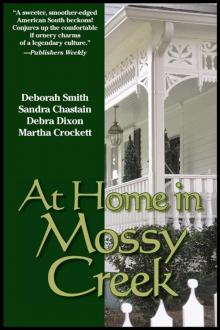 At Home in Mossy Creek
At Home in Mossy Creek Charming Grace
Charming Grace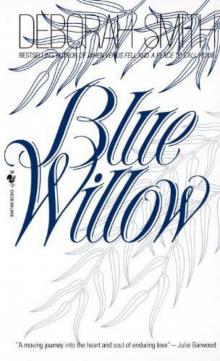 Blue Willow
Blue Willow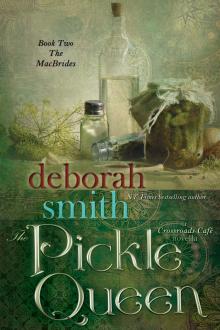 The Pickle Queen: A Crossroads Café Novella
The Pickle Queen: A Crossroads Café Novella On Bear Mountain
On Bear Mountain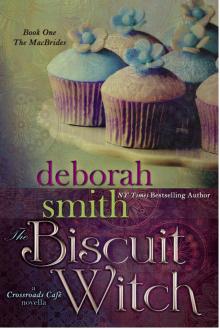 The Biscuit Witch
The Biscuit Witch Sara's Surprise
Sara's Surprise More Sweet Tea
More Sweet Tea The Apple Pie Knights
The Apple Pie Knights The Silver Fox and the Red-Hot Dove
The Silver Fox and the Red-Hot Dove Sweet Hush
Sweet Hush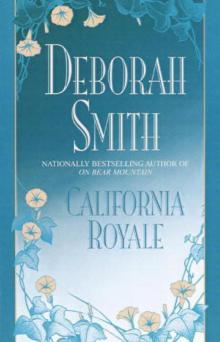 California Royale
California Royale Hot Touch
Hot Touch Miracle
Miracle The Stone Flower Garden
The Stone Flower Garden A Place to Call Home
A Place to Call Home Silk and Stone
Silk and Stone Honey and Smoke
Honey and Smoke Jed's Sweet Revenge
Jed's Sweet Revenge Silver Fox and Red Hot Dove
Silver Fox and Red Hot Dove The Kitchen Charmer
The Kitchen Charmer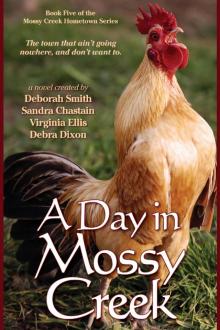 A Day in Mossy Creek
A Day in Mossy Creek Never Let Go
Never Let Go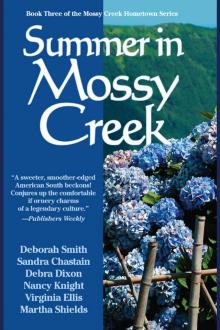 Summer in Mossy Creek
Summer in Mossy Creek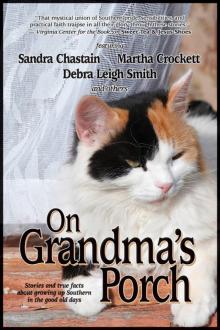 On Grandma's Porch
On Grandma's Porch The Crossroads Cafe
The Crossroads Cafe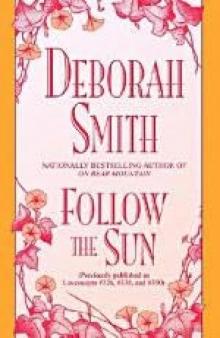 Follow the Sun
Follow the Sun The Yarn Spinner
The Yarn Spinner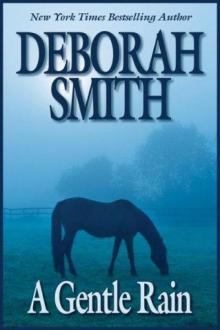 A Gentle Rain
A Gentle Rain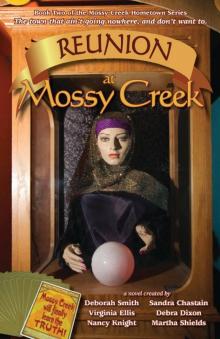 Reunion at Mossy Creek
Reunion at Mossy Creek